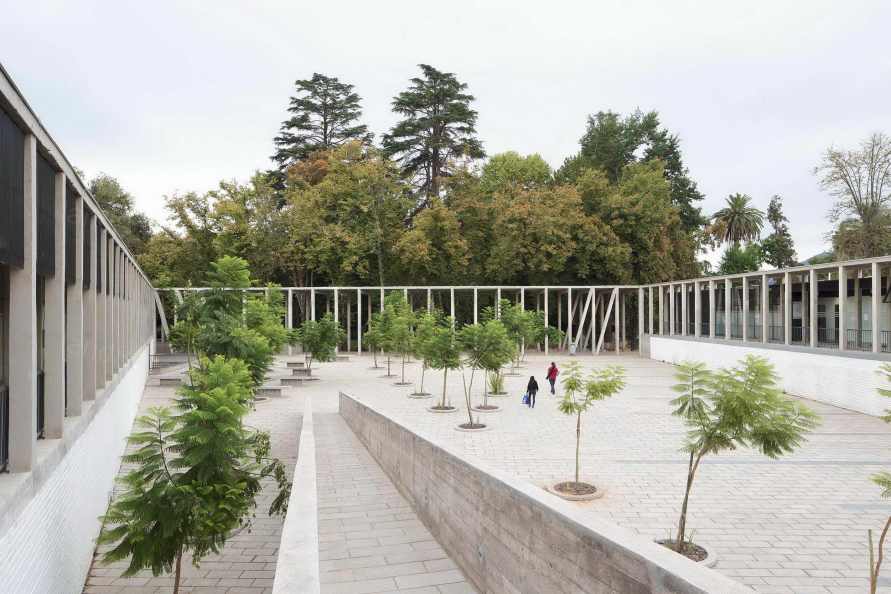Nancagua是智利中部的一个农村小镇,新的市政厅旨在创造一个能够容纳各种公共场合和活动的空间。由于它的位置靠近一个古老的公共公园和一些历史建筑,它也使得恢复和加强当地的自然和人工遗产成为可能。
The new
City Hall in Nancagua, a small rural town in Central Chile, aims to create a space
able to accommodate various public situations and events. Because of its
location, close to an old public park and to several historical buildings, it
also makes possible the recovery and enhancement of the local heritage, both
natural and manmade.

该项目在公众竞赛中胜出,其重点不在于建造一个标志性的体量,而在于创造一个令人难忘的公共空间,将城市与宝贵的、但以前被忽视的公共公园有效地连接起来。与其他具有高度公民精神的空间一样,如希腊阿索斯的agora或威尼斯的圣马可广场,该项目强调的是空间的设计,而不是孤立建筑的设计。具有公共性质的空间被创造出来,使其成为公共生活的催化剂。
The
project, winner of a public competition, focuses not on the construction of an
iconic volume, but rather on the creation of a memorable and public void that
effectively connects the city with the valuable, but previously overlooked
public park. As with other spaces with a high civic spirit, like the agora of
Assos in Greece or the Piazza San Marco in Venice, the project emphasizes the
construction of a void over the construction of isolated buildings. Spaces with
a public void is created and “charged” so that it becomes a catalyst for public
life.

为了将城市与公园连接起来,我们提出了一个开放的广场,将城市与公园连接起来,在其两个较长的边上(南北)被新的市政建筑所限制。广场在竞赛简介中并不存在,但却成为项目的中心。一个城市的空白,允许各种意想不到的情况和事件发生,无论是个人还是集体。
In order
to connect the city with the park we propose an open square that links the city
with the park, limited on its two longer sides (north and south) by the new
municipal building. The square, non-existent in the competition brief, becomes
the centre of the project. An urban void that allows for a wide range of
unexpected situations and events to happen, whether individual or collective.


该项目在广场的另外两端建立了联系,它们面对的是完全不同的现实,对这两端作出相应的反应:当它在街道上创造了一个空旷的角落,打开了城市的大门,它建立了一个门廊和一个台阶,上升到公园上方。这两个门槛共同作用,有效地将城市与公园以渐进和连续的顺序连接起来。因此,我们希望能还原百年公园的荒废状况,使其出现并拉近与城市的距离。
The
project builds a connection between the two other ends of the square, which
face completely different realities, reacting accordingly to both of them:
while to the street it creates a void corner which opens the city, it builds a
portico and a step that rises over the park. These two thresholds work
together, effectively connecting the city with the park in a gradual and
continuous sequence. Thus, we hope to revert the derelict condition of the
centennial park, making it appear and bringing it closer to the city.

由一个规则的柱廊形成的画廊,它的大小和物质性来自于公园的前赞助人之家的画廊,它的前身是城市的市政厅,是界定和统一主要的中心空间。同时,在较小的规模上--更多的是家庭生活--是在这些长廊里,日常生活将在这里进行,将所有可能发生的事情以一种不可预见和不可控制的方式隐藏在建筑后面。
Galleries
formed by a regular colonnade, which takes its size and materiality from the
galleries of the former patronal house of the park, and which was formerly used
as the city’s town hall, is what defines and unifies the main central space. At
the same time, but on a smaller scale –more domestic as it were- is in these
galleries where the daily life will take place, hiding all what could happen in
an unforeseeable and uncontrollable way with the building behind.

▽场地区位 Location

▽入口层平面图 Ground floor plan

▽一层平面图 First floor plan

▽立面图 Elevation

▽轴侧分解 Axonometric View

▽构造大样 Construction Detail Section

Project name: Nancagua Town Hall,
A New Public Threshold
Company name:Beals-Lyon
Arquitectos
Website:www.beals-lyon.cl
Contact e-mail:info@beals-lyon.cl
Project
location:Nancagua, O’Higgins Region, Chile
Completion Year:2016
Building area (.0m²): 2.300m2 +
2.500m2 (public square)
Photo credits: Felipe Fontecilla,
www.font.cl, felipe@font.cl
|